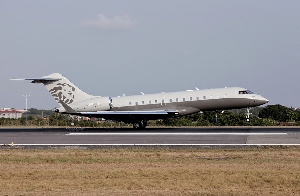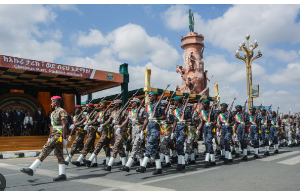Africa is a continent deeply rooted in spiritual beliefs, where each group of people holds fast to its own systems and practices.
Motivated largely by their interest in ancestry, African religion and the desire to embrace their ancestors on a spiritual level, two Jamaican-born, South Florida women have prepared for their initiation into the Akan priesthood, a spiritual tradition from the West African country of Ghana.
The graduation ceremony, called Akom Yie, is being held at 2 p.m. Sunday at Markham Park in Sunrise.
The event follows three years of intense study and sacrifice – including celibacy, isolation from friends and going without foods that contain sugar – for Afua Fofie and Akua Bakofua. Afua means a “female born on Friday’’; Akua means a “female born on Wednesday.’’
The two women have also adopted Akan last names. They will be presented with wooden priest stools that are specific to the Akan people of Ghana.
“The stool is said to hold the souls of the Ashanti people,” explained Nana Mena Yaa of Pembroke Pines, who serves as chief priest for the Nana Adade Shrine in South Florida. Nana Yaa will supervise this weekend’s event.
“Being given [a stool] says that you have a certain status in the community,’’ Nana Yaa said. ‘”People will come to you seeking advice be it for work, family, spiritual or health.”
As priests, the women can perform weddings, naming ceremonies and many of the same rituals and rites of passage that priests of any traditional religion can perform.
The Akom religion has existed from the beginning of time, but it was during the seventeenth or eighteenth century that a priest is said to have conjured the stool from the heavens for one of the Ashanti kings, according to the Jamaican-born Nana Yaa.
“Be you a chief or queen mother, you receive a stool on which to sit,” she said. Akom Yie is the highest ceremony for longtime students of the religion, Nana Yaa said.
“The rituals are similar to traditional churches; something in which the public can participate,” she said. The two graduate Okomfos, or priests, will be presented to the community; elders from Ghana and other African countries, as well as the Americas, will be present.
The elders will share their roles and responsibilities, as well as any contribution they are giving to the students.
“Many times people may not be teachers directly, but are in fact teachers by way of participation and what they are willing to give,” said Nana Yaa.
A 20-year student of African religion, Nana Yaa has been a graduate Okomfo for seven years.
The Akan people were the first to migrate from east to West Africa. Many came across the Ghanaian Empire; some settled around the Tano River; others migrated across the Volta River. About 40 percent of the Jamaican population is of Akan descent, Nana Yaa said.
“You have a combination of Ibo, Congo and Yoruba. Many mixed in the stages when they ran from the slave masters and settled into the Maroon communities,” she said. Fofie, a native of Irish Town, Jamaica and lifetime student of African religion, admits that the sacrifices required throughout the training were difficult.
“Each one, at the time I went through it, seemed the worst,” she said. One that stands out for Fofie was the test of being isolated.
“I couldn’t call anyone; my friends could not come for a visit,’’ she said. “The point of it, as explained by my deities, was that if no one was there, they were. No matter the challenge, they were always there to help me through.
“Then I couldn’t have sugar. I was surprised to learn just how much of what we eat contains it. From that I learned to become more conscientious. It’s a discipline that has expanded into other areas of my life.
“The celibacy,” Fofie admits, “contrary to what some think, was not at all challenging. It was simply something I put aside during my spiritual growth.”
Fofie is married. But whether one is married or not, according to the Akan tradition, when someone enters the study and training for the priesthood, he or she must enter a period of celibacy. The length of time required for celibacy is private, according to Nana Yaa.
Bakofua, raised in New York City, began her journey into the Akom religion in 1999. Her parents embraced Africa and were instrumental in helping her develop her studies.
“My parents knew who they were and wanted me to know myself as well. I had been reading about the different religions since I was a small child. I was even exposed to Yoruba traditions, of which I never had any fear,” she said.
The process of training is similar to an incubation period, according to Nana Yaa.
“You come out in the open when a child is born; you have ceremonies for the community to welcome and receive him. In many ways, this process is similar,’’ she said. “During the training, they are supervised closely by a teacher or teachers who facilitate their connection with the divinity, the ancestors, teaching of herbs and the various aspects of the culture as it relates to that part of the country,” Nana Yaa said.
There a many ways that Africans revere their ancestors; and they have many names for God, Nana Yaa said.
Fofie said that she finds it difficult to describe exactly just how far she has come in her study of African religion.
“I would encourage everyone to explore what is theirs. I’m in a good place now; a little anxious about the ceremony, but excited about the possibilities of what my journey will bring,” she said.
IF YOU GO
WHAT: Two Jamaican-born South Florida women are being initiated into the Akan priesthood of Ghana.
WHEN: 2 p.m. Sunday, Oct. 28, 2007
WHERE: Markham Park, Pavillion 7 (outdoors), 16001 W State Road 84, Sunrise
COST: The event is free, but the park charges an entrance fee of 1.50 per person. Children under 5 are admitted to the park for free. Special guests to the event must have a pass.
CONTACT: Nana Mena Yaa: 954-604-2969.
Diaspora News of Saturday, 27 October 2007
Source: browardtimes.co












